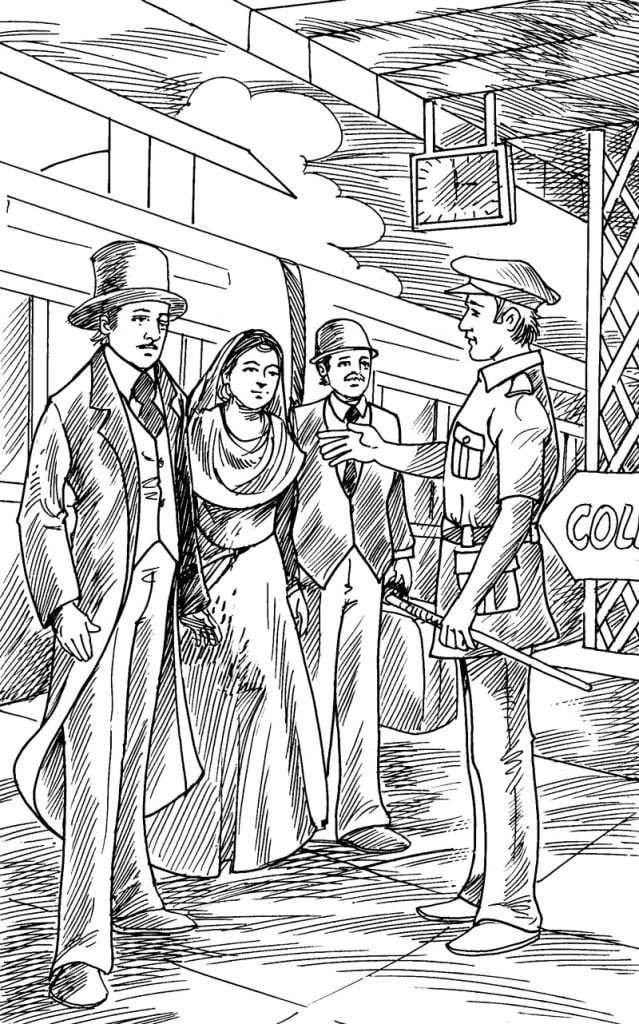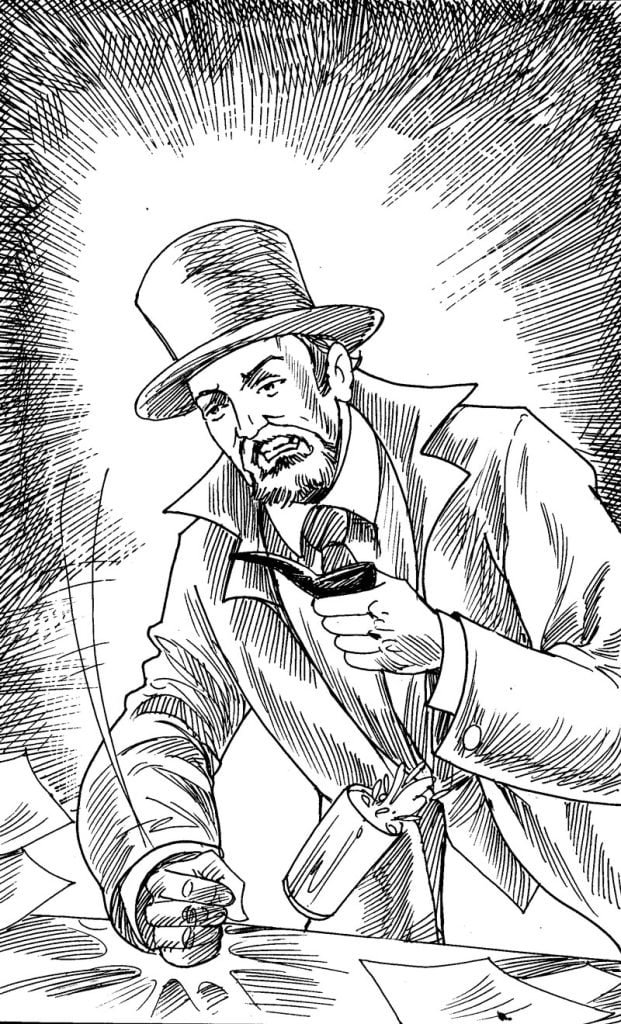Chapter 5
Aouda, as the young woman was called, was also a Parsee. Famed for her beauty, she was the daughter of a rich merchant in Bombay and had received English education. After her father had died, she was forced to marry the old rajah. When she ran away, she was caught and brought back. Now she faced a horrible death.
The would-be rescuers hid in the trees near the pagoda to await nightfall. They hoped to slip past the Brahmins into the pagoda, but guards with torches and sabers stood at all the entrances. Passepartout, noticing that the Brahmins were drunk, began to work on another plan of rescue.
Dawn came, and the hour of sacrifice was at hand. The Brahmins built a platform, or funeral pyre, and laid the rajah’s body on it. Then the priests led Aouda out of the pagoda. She had been drugged and was helpless to free herself. She was stretched out beside her husband’s body. The priests soaked the funeral pyre with oil and set a torch to it. Flames leaped up at once.
Suddenly, the cries of terror came from the crowd. The old rajah was alive! He stood up, took his wife in his arms, and, surrounded by fire and smoke, climbed down from the funeral pyre. He walked over to Phileas Fogg and said, “Let us be off!”
Passepartout was the ‘rajah’. In the moments before dawn, under the cover of darkness, he had hidden the body of the real rajah and placed himself on the funeral pyre instead.
Aouda, still in a drugged sleep, was lifted onto the elephant, and the travellers rode quickly through the forest. When the Brahmins discovered the trick, they ran after the elephant, shooting bullets and arrows. It was too late, however. Aouda was a safe distance away.
Passepartout was delighted at the success of his rescue mission. Sir Francis, however, warned that if Aouda didn’t leave India she would be recapturd sooner or later and sacrificed.
At 10:00, the travellers arrived at the Allahabad railroad station. Aouda awoke slowly from the effects of the drugs. She was indeed beautiful and spoke English very well.
Phileas Fogg said good–bye to the Parsee giving him not only the money promised for his services, but also the elephant. Fogg, Passepartout, Aouda and Sir Francis then boarded the train for Calcutta.
Aouda awoke to find herself dressed in European–style clothes and travelling on a train with perfect strangers. Fogg offered to take her out of India so that the Brahmins might not recapture her. He invited her to go with him to the colony of Hong Kong, which lay off the coast of China and was ruled by England. Aouda said that she would look up her cousin, Jeejeeh, who lived in Hong Kong.
Sir Francis got off the train in Benaras. Morning, it arrived at Calcutta. Phileas Fogg had gained two days between London and Bombay and lost two days travelling across India, so he was exactly on schedule.
“Are you Mr. Phileas Fogg?” asked a policeman at the Calcutta station.
“Yes.”
“And is this man your servant?”
“He is.”
“Please follow me.”

Fogg, Passepartout and Aouda were taken to a room with bars on the windows.
“You must appear before the judge at 8:30,” said the policeman.
“We are prisoners!” shouted Passepartout, “Now we shall miss the Hong Kong steamer.”
“Leave me here and go,” said Aouda, “If you hadn’t rescued me, you would not have been in this prison.”
“Don’t be silly,” snapped Phileas Fogg, “Besides, we’ll all be on the steamer by noon.”
At 8:30, the policeman led the prisoners to a courtroom. Three priests stood in front of the judge. They accused Fogg and Passepartout of misbehaving in a Brahmin holy place.
“I admit our guilt,” Fogg said, “but the priests were about to perform a human sacrifice!”
“That’s right,” added Passepartout, “These priests are from the pagoda of Pillaji.”
“No, said the priests. “We are from Bombay. Here is a pair of shoes that was left behind.”
“Those are mine!” cried Passepartout. Detective Fix had promised the priests a reward if they would follow Passepartout to Calcutta. Now Fix was hiding in the courtroom. His plan was to delay Phileas Fogg so that he might not leave India before the arrest warrant arrived for the bank robber.
“Since you have admitted your guilt,” the judge told Passepartout, “and since the English law protects Indian religions very strictly, I order you to spend 15 days in jail and pay a fine of 300 pounds.”
The judge then turned to Phileas Fogg.
“A master must be responsible for the acts of his hired servant. Therefore, Mr. Fogg, I order you to spend a week in jail and pay a 150 pound fine.”
Fix rubbed his hands in glee. Surely a week would be enough time for the arrest warrant to come from London.
“I offer bail,” declared Phileas Fogg.
“All right,” said the judge, “but the bail will be 1,000 pounds for each man. And if you leave India before your sentence is up, the money will not be returned.”

Fix was furious. The robber was about to escape again. He knew Fogg would gladly leave the bail money behind rather than miss the Hong Kong steamer.
Fogg, Passepartout and Aouda reached the harbour at 11:00 with an hour to spare. Fix decided to follow them to Hong Kong.

